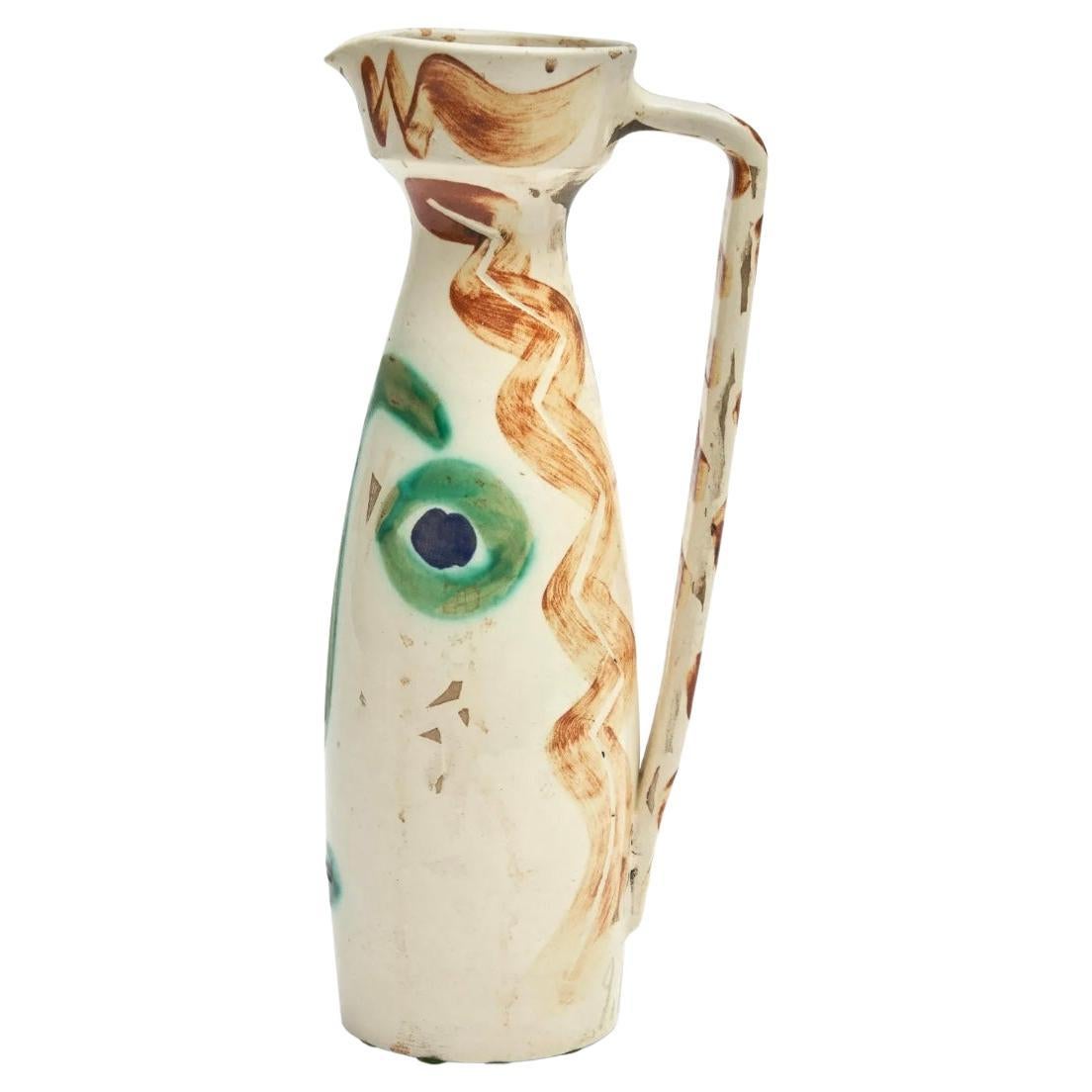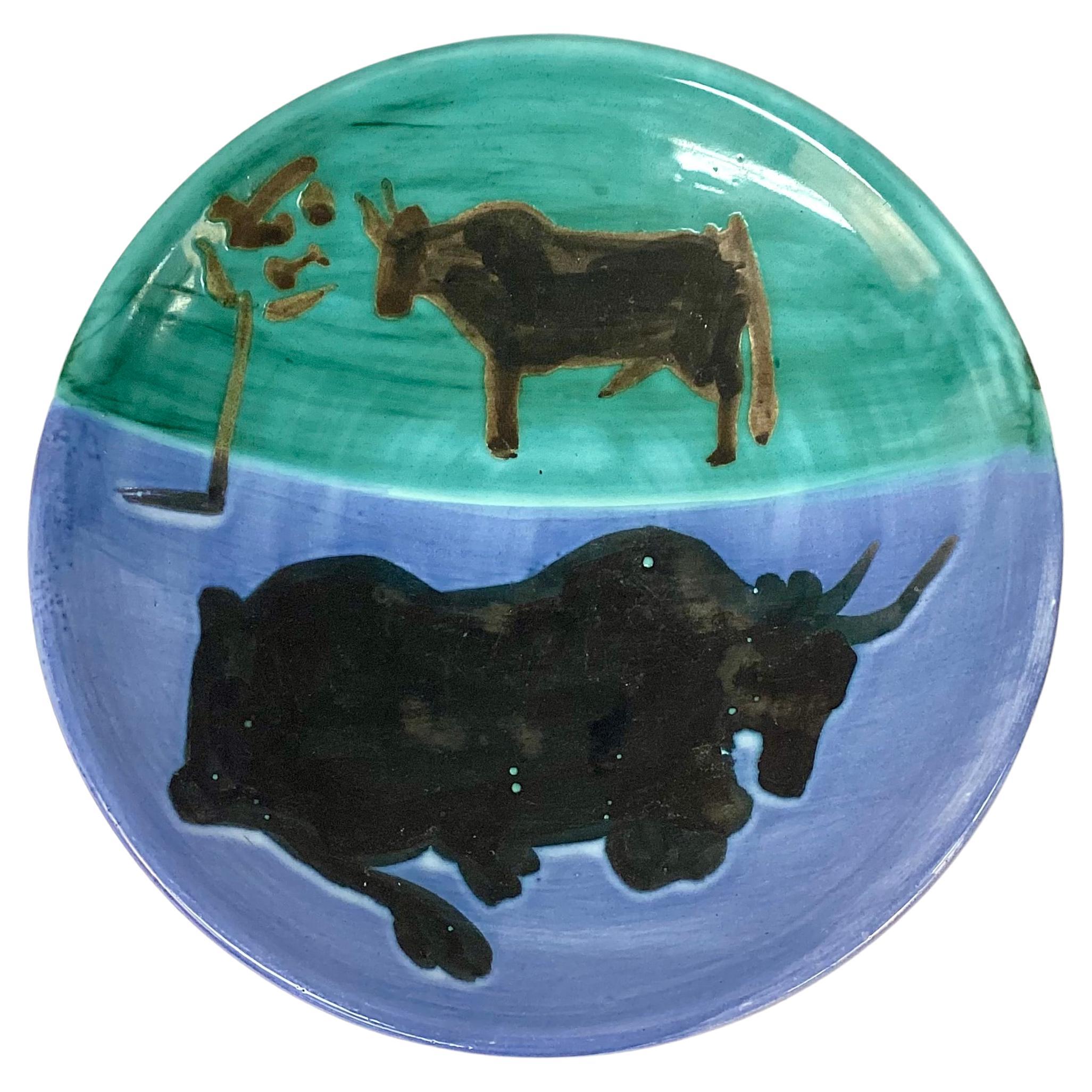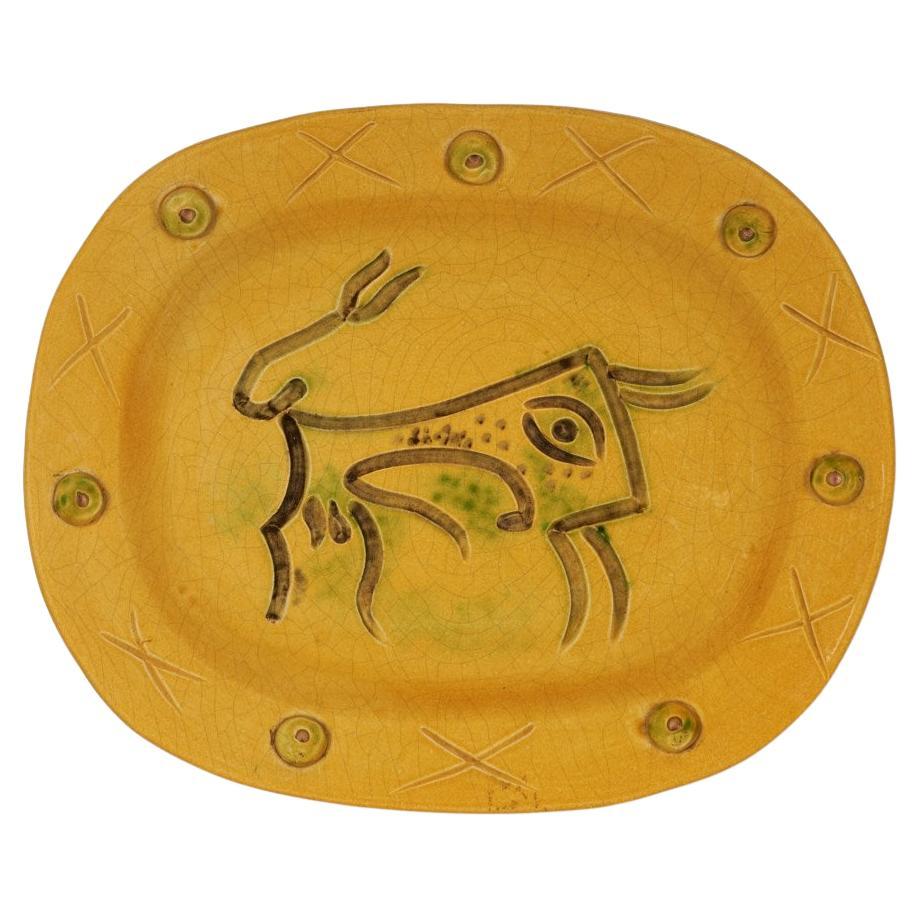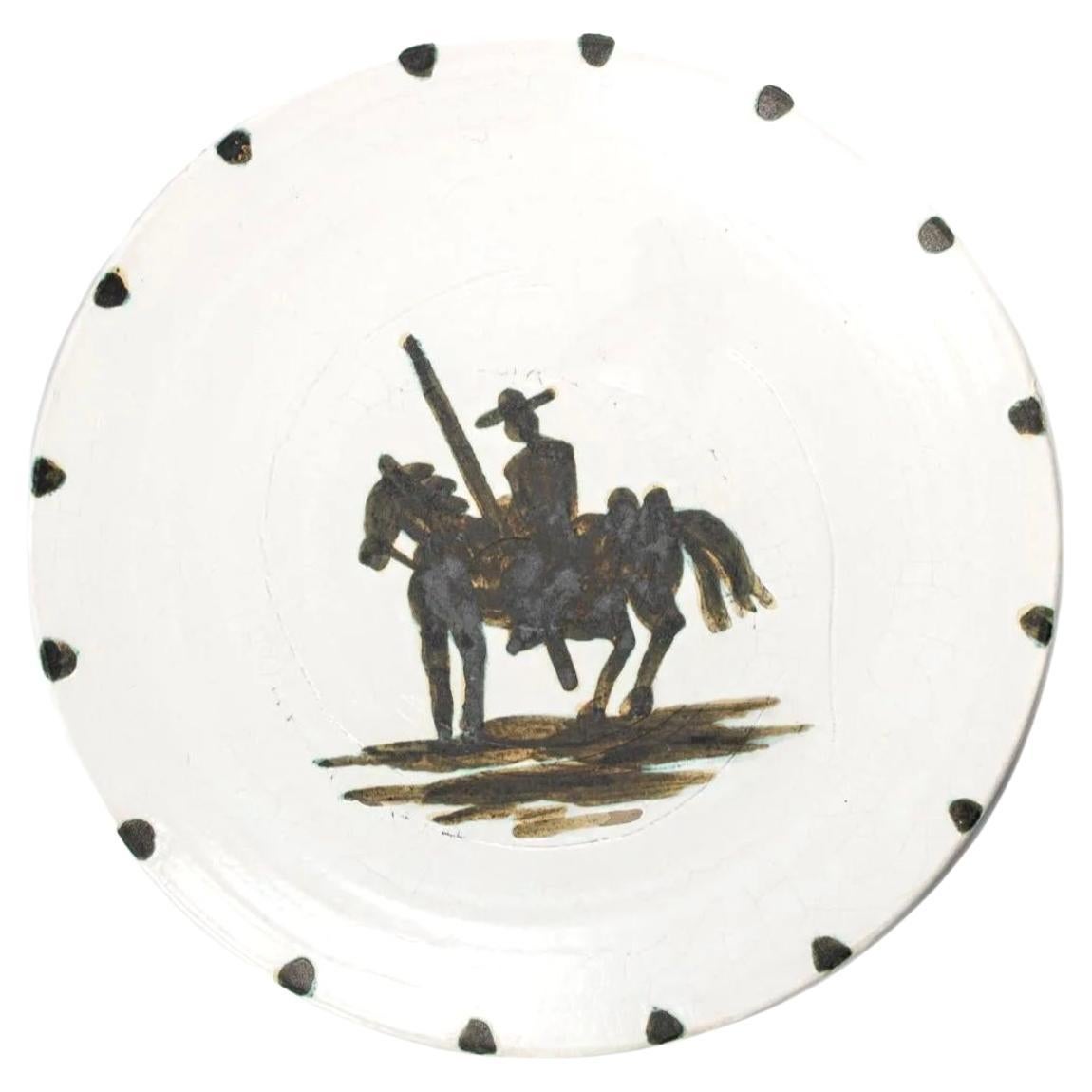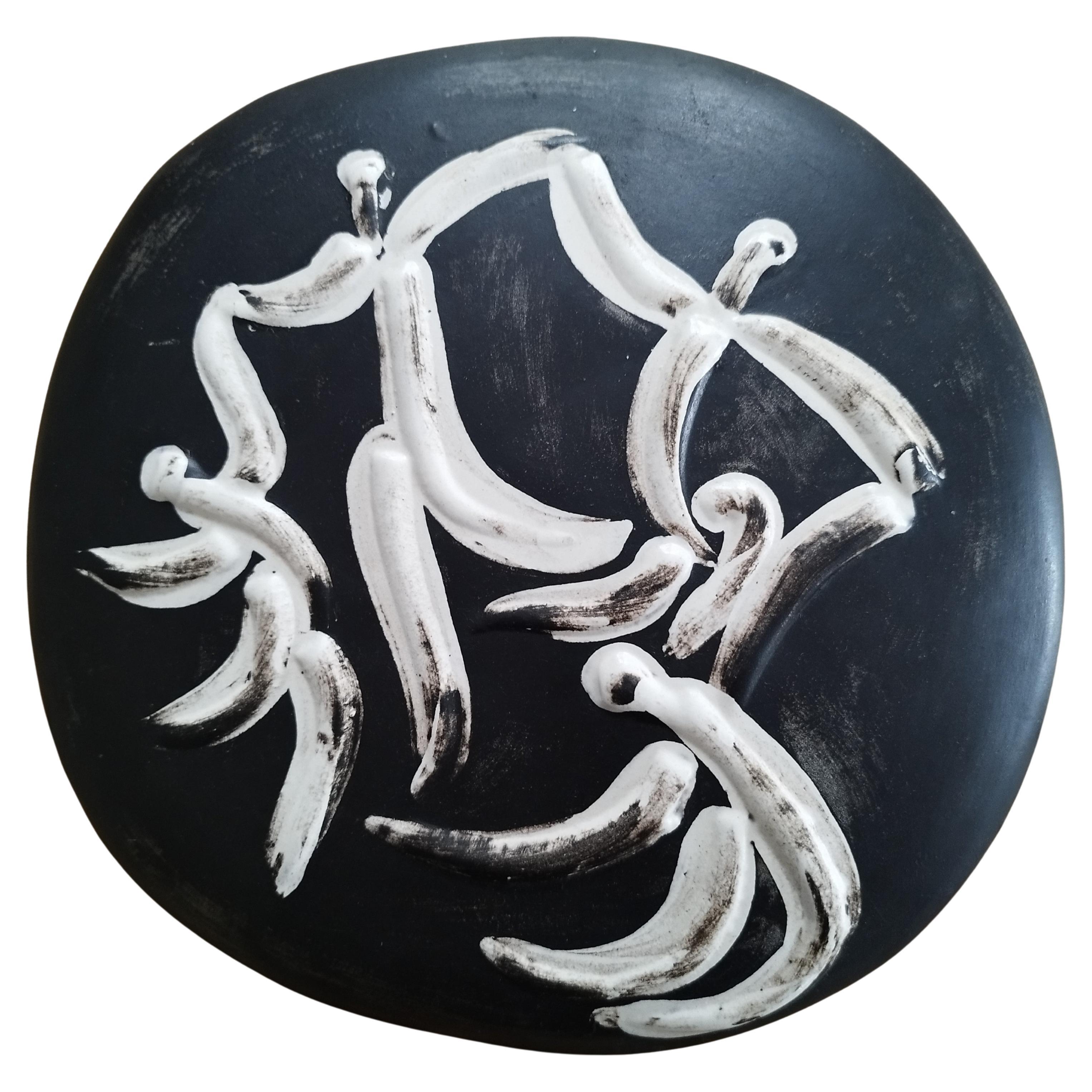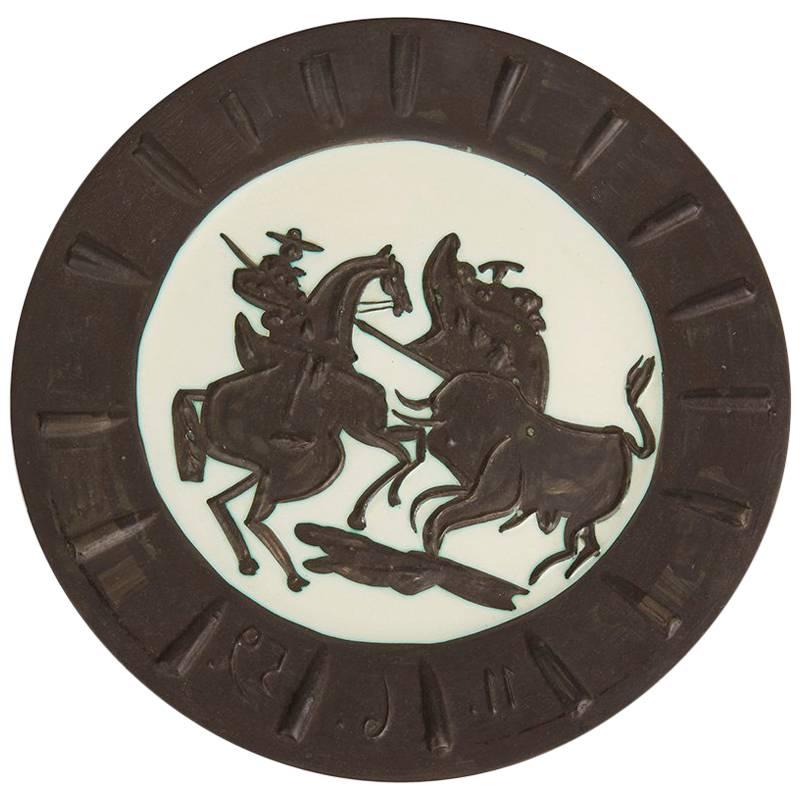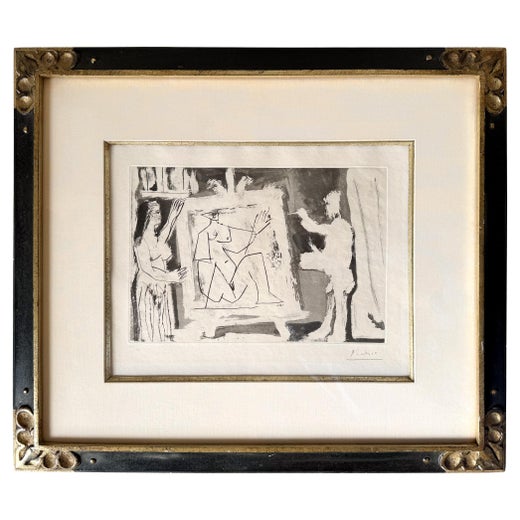Pablo Picasso "Taureau Sous L'arbre" Madoura Ceramic Plate
About the Item
- Creator:Pablo Picasso (Artist)
- Dimensions:Height: 1 in (2.54 cm)Diameter: 7.75 in (19.69 cm)
- Style:Modern (In the Style Of)
- Materials and Techniques:
- Place of Origin:
- Period:
- Date of Manufacture:1952
- Condition:Wear consistent with age and use.
- Seller Location:Bradenton, FL
- Reference Number:
Pablo Picasso
One of the most prolific and revolutionary artists the world has ever seen, Pablo Picasso had a tremendous impact on the development of 20th-century modern art. Although he is best known for his association with the Cubist movement, which he founded with Georges Braque, Picasso’s influence extends to Surrealism, neoclassicism and Expressionism.
“Every act of creation is, first of all, an act of destruction,” the Spanish artist proclaimed. In Picasso's Cubist paintings, he emphasizes the two-dimensionality of the canvas, breaking with conventions regarding perspective, foreshortening and proportion. Picasso was inspired by Iberian and African tribal art. One of his most famous pre-Cubist works is Les Demoiselles d’Avignon (1907), a painting considered immoral and shocking at the time for its depiction of nude women whose faces resemble Iberian tribal masks.
Picasso made many portraits in this style, most often of the women in his life, their expressively colored faces composed of geometric shards of surface planes. In Woman in a Hat (Olga), 1935, he painted his first wife as an assemblage of abstract forms, leaving the viewer to decipher the subject through the contrasting colors and shapes. Picasso was a tireless artist, creating more than 20,000 paintings, drawings, prints, ceramics and sculptures. Tracing his life’s work reveals the progression of modern art, on which he had an unparalleled influence.
Browse an expansive collection of Pablo Picasso's art on 1stDibs.
- ShippingRetrieving quote...Ships From: Bradenton, FL
- Return PolicyA return for this item may be initiated within 14 days of delivery.
- Pablo Picasso "Visage" Madoura Ceramic PitcherBy Pablo PicassoLocated in Bradenton, FLPablo Picasso (1881-1973) "Visage" Madoura Ceramic Pitcher, Vallauris, France, incised date "9.1.69" beneath handle, conceived in 1969 in an edition of 500, earthenware with engravi...Category
Mid-20th Century French Modern Pottery
MaterialsCeramic
- Pablo Picasso, Toros PlateBy Pablo PicassoLocated in Bradenton, FLThis Picasso ceramic plate, "Toros" is one in an edition of 500 and is made of white earthenware clay with englobes and oxidized paraffin decoration and enamel. The piece is stamped ...Category
20th Century French Modern Pottery
MaterialsCeramic
- Pablo Picasso “Picador” Pottery Plate, Limited Edition, 1952By Pablo PicassoLocated in Bradenton, FLPablo Picasso (Spanish, 1881-1973), "Picador" (A.R. 160) 1952, white earthenware plate. Madoura Plein Feu and Editions Picasso stamps on underside, inscribed: "Editions Picasso" bene...Category
Mid-20th Century Spanish Mid-Century Modern Pottery
MaterialsPottery
- 17th Century Spanish Hispano Moresque Copper Lustre Ceramic BowlLocated in Bradenton, FLEarly 17th century Hispano Moresque bowl with copper glaze, from Spain. Hispanic Moresque earthenware has an Islamic style created by the Moors produced under Christian rule, merging...Category
Antique 17th Century Spanish Moorish Pottery
MaterialsCeramic
- 17th Century Hispano-Moresque Copper-Lustre ChargerLocated in Bradenton, FL17th C. Spanish Hispano Moresque Copper Lustre ceramic bowl / charger.Category
Antique 17th Century Spanish Bakshaish Pottery
MaterialsPottery
- 18th Century Italian Majolica Faience Pottery Putto Framed TilesLocated in Bradenton, FLWonderful rare 18th century Italian Faience Maiolica framed tiles. Bright, vivid and colorful framed tiles depicting a chubby putto or cherub sitting on a branch petting the head of ...Category
Antique 18th Century Italian Other Pottery
MaterialsPottery
- Pablo Picasso Ceramic Plate 'Taureau Gravé'By Pablo PicassoLocated in Paris, FRWhite earthenware ceramic plate, partially engraved, with colored engobe and glaze. Stamped, marked, and numbered 'Edition Picasso / Madoura Plein Feu / I 107/ 20 / 200' (underneath...Category
Vintage 1940s Ceramics
MaterialsCeramic
- Pablo Picasso Madoura "Quatre Danseurs" PlateBy Pablo PicassoLocated in NANTES, FRPablo PICASSO (1881-1973) Quatre danseurs, 1956. Plaque murale convexe. Épreuve originale en faïence blanche à décor fond noir, tirée à 450 exemplaires Cachet "Empreinte Originale de...Category
Mid-20th Century French Mid-Century Modern Ceramics
MaterialsCeramic
- Pablo Picasso, Scène De Tauromachie Dish 'A. R. 412'By Pablo PicassoLocated in Bishop's Stortford, HertfordshireTerre de faïence dish 1959 numbered 52/100 and incised 'Empreinte Originale de Picasso' & 'Madoura' stamps. The dish is centrally decorated with a scene comprising of a matador br...Category
Vintage 1950s European Mid-Century Modern Pottery
MaterialsPottery
- Pablo Picasso Dish, Corrida White Earthenware Dish 1953 'A.R.182'By Pablo PicassoLocated in Bishop's Stortford, HertfordshireTerre de faïence dish, 1953, from the edition of an unknown size (Alain Ramié states that only a few copies of this subject were produced). The dish is centrally decorated with a ...Category
Vintage 1950s European Mid-Century Modern Pottery
MaterialsEarthenware, Pottery
- Ceramic Plate Visage Gris 'Grey Face' A.R. 206 by Pablo Picasso & Madoura, 1953By Madoura, Pablo PicassoLocated in New York, NYThe engraved and brush painted ceramic plate, Visage Gris (Grey Face) is one the most iconic pieces created by Pablo Picasso (1881 - 1973) at the Madoura workshop in Vallauris, France. It is said "all portraits are self portraits". In this work, we see Picasso's wistfulness, vulnerability and humor set within a beautiful image representing both the sun and the moon, the masculine and the feminine. Picasso mastery of form, image, composition and subtle color is evident in a work that resonates transcendence. Created in 1953, Pablo Picasso ceramic Visage Gris (Grey Face), 1953 A.R. 206 is a Madoura white earthenware clay, knife engraved under partial brushed glaze with decoration in engobes (green, black, white) from the edition of 500. This work is stamped with the 'Madoura PLEIN FEU' and ‘EMPREINTE ORIGINALE DE PICASSO’ pottery stamps on the reverse. Dimensions: 12 3/8 x 15 1/8 x 1 5/8in (31.4 x 38.3 x 4.1cm). Madoura was an artisan workshop created by Georges and Suzanne Ramie which collaborated with Picasso in the fabrication and hand painting of the works. Pablo Picasso designed 633 different ceramic editions between 1947 and 1971 at the Madoura workshop, with a number of variants and unique pieces resulting from these initial works. He began by creating simple, utilitarian objects such as plates and bowls, but later produced more complex forms, including pitchers and vases — their handles occasionally shaped to form facial features, or anatomical parts of his animal subjects. Picasso remains one of the highest-grossing artists at auction today, and the range of his ceramics means it's possible to find both a good investment and a beautiful object. Visage Gris is among the most important. A Short Biography follows: Pablo Picasso revolutionized the art world and to many is THE artist of the 20th century. He is famous for his role in pioneering Cubism with Georges Braque and for his melancholy Blue Period pieces. Original signed Picasso lithographs and prints are a sure investment. Madoura Picasso ceramics are highly collectible in their own right. As one of the most influential Modern artists of the 20th century, Pablo Picasso is renowned as a legendary artistic master to this day. Born on October 25, 1881 in Malaga, Spain, Pablo Picasso was a child prodigy who was recognized as such by his art-teacher father, who ably led him along. The small Museo de Picasso in Barcelona is devoted primarily to his early works, which include strikingly realistic renderings of casts of ancient sculpture. Picasso was a rebel from the start and, as a teenager, began to frequent the Barcelona cafes where intellectuals gathered. He soon went to Paris, the capital of art, and soaked up the works of Edouard Manet, Gustave Courbet, and Henri de Toulouse-Lautrec, whose sketchy style impressed him greatly. Then it was back to Spain, a return to France, and again back to Spain – all in the years 1899 to 1904. Before he struck upon Cubism, Picasso went through a prodigious number of styles – realism, caricature, the Blue Period, and the Rose Period. These distinguished styles are apparent in the unique original works as well as Picasso ceramics, lithographs, linocuts, and etchings that he created later in his life. The Blue Period dates from 1901 to 1904 and is characterized by a predominantly blue palette and focuses on outcasts, beggars, and prostitutes. This was when he also produced his first sculptures. The most poignant work of the style, La Vie (1903), currently located in Cleveland’s Museum of Art, was created in memory of his childhood friend, the Spanish poet Carlos Casagemas, who had committed suicide. The painting started as a self-portrait, but Picasso’s features became those of his lost friend. The composition is stilted, the space compressed, the gestures stiff, and the tones predominantly blue. The Rose Period began around 1904 when Picasso’s palette brightened and is dominated by pinks and beiges, light blues, and roses. His subjects are saltimbanques (circus people), harlequins, and clowns, all of whom seem to be mute and strangely inactive. One of the premier works of this period is Family of Saltimbanques (1905), currently in Washington, D.C. at the National Gallery, which portrays a group of circus workers who appear alienated and incapable of communicating with each other, set in a one-dimensional space. In 1905, Picasso went briefly to Holland, and on his return to Paris, his works took on a classical aura with large male and female figures seen frontally or in distinct profile, as in early Greek art. One of the best examples of this style is in the Albright-Knox Gallery in Buffalo, NY, La Toilette (1906). Several pieces in this new, classical style were purchased by Gertrude Stein (the art patron and writer) and her brother, Leo Stein. With his groundbreaking 1907 painting Les Demoiselles d’Avignon...Category
Mid-20th Century French Mid-Century Modern Figurative Sculptures
MaterialsEarthenware
- Ceramic Plate by Pablo Picasso, 1953By Pablo PicassoLocated in Hamburg, PACorrida sur fond noir ceramic plate by Pablo Picasso dated "25.9.53" stamped and marked "Madoura Plein Feu/Edition Picasso/D'Apres Picasso" (unde...Category
Vintage 1950s European Mid-Century Modern Ceramics
MaterialsCeramic
Recently Viewed
View AllRead More
Science Uncovers Hidden Truths behind Young Pablo Picasso’s Blue Period
From 1901 to 1904, Picasso limited his palette to bluish hues in producing some of his most famous early works. A new show looks at the recycled materials, hidden underpaintings, surprising influences and bohemian lifestyle that led to their creation.
Who Are the Most Popular Artists on 1stdibs?
Learn the stories of some of the world's most recognizable artworks and their makers.
